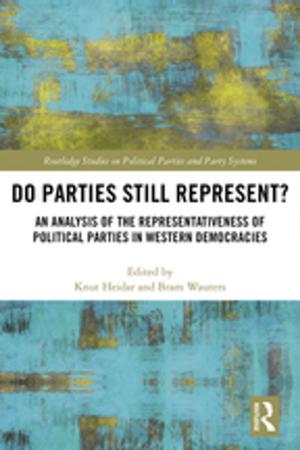Behavioralism in Political Science
Nonfiction, Health & Well Being, Psychology, Social & Cultural Studies, Political Science| Author: | Richard J. Gelles | ISBN: | 9781351314343 |
| Publisher: | Taylor and Francis | Publication: | September 8, 2017 |
| Imprint: | Routledge | Language: | English |
| Author: | Richard J. Gelles |
| ISBN: | 9781351314343 |
| Publisher: | Taylor and Francis |
| Publication: | September 8, 2017 |
| Imprint: | Routledge |
| Language: | English |
Changes in the thinking of science are usually accompanied by lively intellectual conflicts between opposing or divergent points of view. The clash of ideas is a major ingredient in the stimulation of the life of the mind in human culture. Such arguments and counter-arguments, of proofs and disproofs, permit changes in the arts and sciences to take place. Political science is not exempt from these conflicts.
Since the middle of the twentieth century, the study of politics has been rocked by disagreements over its scope, theories, and methods. These disagreements were somewhat less frequent than in most sciences, natural or behavioral, but they have been at times bitter and persuasive. The subject matter of political science politics and all that is involved in politics has a halo effect. The stakes of politics make people fight and sometimes die for what they claim as their due. Political scientists seem to confuse academic with political stakes, behaving as if the victories and defeats on the battleground of the intellect resemble those on the battleground of political life.
Three issues seem critical to political science at the time this volume first appeared in the 1960s: First, disagreement over the nature of the knowledge of political things is a science of politics possible, or is the study of politics a matter of philosophy? Second, controversy over the place of values in the study of politics a controversy that makes for a great deal of confusion. Third, disagreements over the basic units of analysis in the study of politics‘should the political scientist study individual and collective behavior, or limit the work to the study of institutions and large-scale processes? This collection brings together the most persuasive writings on these topics in the mid-1960s.
Changes in the thinking of science are usually accompanied by lively intellectual conflicts between opposing or divergent points of view. The clash of ideas is a major ingredient in the stimulation of the life of the mind in human culture. Such arguments and counter-arguments, of proofs and disproofs, permit changes in the arts and sciences to take place. Political science is not exempt from these conflicts.
Since the middle of the twentieth century, the study of politics has been rocked by disagreements over its scope, theories, and methods. These disagreements were somewhat less frequent than in most sciences, natural or behavioral, but they have been at times bitter and persuasive. The subject matter of political science politics and all that is involved in politics has a halo effect. The stakes of politics make people fight and sometimes die for what they claim as their due. Political scientists seem to confuse academic with political stakes, behaving as if the victories and defeats on the battleground of the intellect resemble those on the battleground of political life.
Three issues seem critical to political science at the time this volume first appeared in the 1960s: First, disagreement over the nature of the knowledge of political things is a science of politics possible, or is the study of politics a matter of philosophy? Second, controversy over the place of values in the study of politics a controversy that makes for a great deal of confusion. Third, disagreements over the basic units of analysis in the study of politics‘should the political scientist study individual and collective behavior, or limit the work to the study of institutions and large-scale processes? This collection brings together the most persuasive writings on these topics in the mid-1960s.















